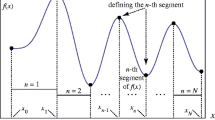Abstract
OK-Quantization Theory for the digitization in value ensures the reconstructivity of the probabilistic density function of the image. This paper shows some experimental demonstrations to reduce the number of the gray levels, and shows mainly that there is a necessary analytical relationship between sampling and quantization based on the equivalence relationship between two kinds of the integral, Riemann and Lebesgue integrals for calculating the volume of the image. Experimental demonstrations are also shown in this paper.
Preview
Unable to display preview. Download preview PDF.
Similar content being viewed by others
References
Shannon, C.E., et al.: The Mathematical Theory of Communication. Univ. Illinois Press (1949)
Hasegawa, J., et al.: The Mathematical Theory of Communication, Meiji Tosho (1969)
Nakata, K.: Vector Quantization of Vowel and Image Signals. Journal of Measurement and Control 25(6), 517–552 (1986)
Isomichi, Y.: Exercise in Information Theory, pp. 53–55. Corona Publishing Company (1983)
Koshimizu, H., et al.: A Practical Method for Estimating Aliasing Error in Image Processing. Trans. IEICE 61-D(6), 443–444 (1978)
Koshimizu, H., et al.: Proposal of Quantization Theorem. In: Proc. VIEW 2002, December 2002, p. 1, Yokohama (2002)
Oteru, O.: Basic Electric Measurement, pp. 236–237. Ohm Publishing Company (1966)
Iijima, T.: Considerations on OK-Quantization Therem by Examples (Feburary 18, 2003)
Koshimizu, H.: On A Mathematical Theory of Quantization — How should image gray value be digitized? In: FCV 2003, Jeju, Korea (Feburary 6, 2003) Invited paper
Koshimizu, H.: On Proposal Of Quantization Theorem and Its Experimental Consideration- Theory of image gray scale dispersion, IEICE(PRUM 2003-66) (May 2003)
Tanaka, Y., Fujiwara, T., Koshimizu, H., Iijima, T.: A Relationship between OK-Quantization and Sampling Theorem and Its Experimental Consideration. In: QCAV 2005, May 2005, pp. 399–404 (2005)
Tanaka, Y., Fujiwara, T., Koshimizu, H., Numada, M.: OK-Quantization Method and Its Theoretical and Experimental Properties. In: MIRU 2005, July 2005, pp. 1495–1502 (2005)
Author information
Authors and Affiliations
Editor information
Editors and Affiliations
Rights and permissions
Copyright information
© 2006 Springer-Verlag Berlin Heidelberg
About this paper
Cite this paper
Tanaka, Y., Fujiwara, T., Koshimizu, H., Iijima, T. (2006). OK-Quantization Theory and Its Relationship to Sampling Theorem. In: Narayanan, P.J., Nayar, S.K., Shum, HY. (eds) Computer Vision – ACCV 2006. ACCV 2006. Lecture Notes in Computer Science, vol 3852. Springer, Berlin, Heidelberg. https://doi.org/10.1007/11612704_48
Download citation
DOI: https://doi.org/10.1007/11612704_48
Publisher Name: Springer, Berlin, Heidelberg
Print ISBN: 978-3-540-31244-4
Online ISBN: 978-3-540-32432-4
eBook Packages: Computer ScienceComputer Science (R0)




